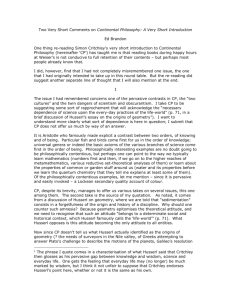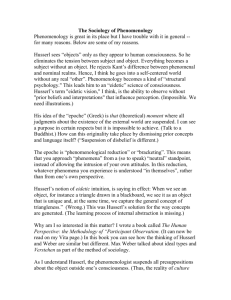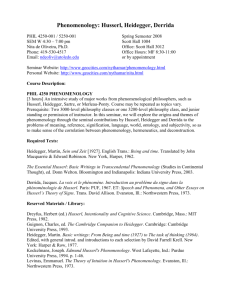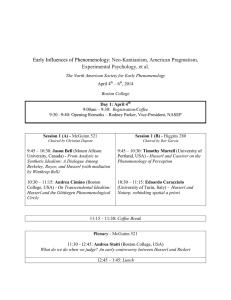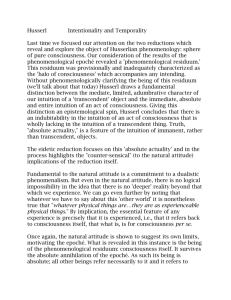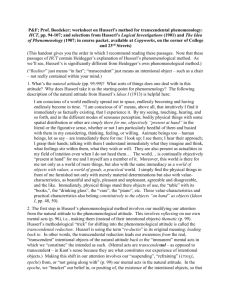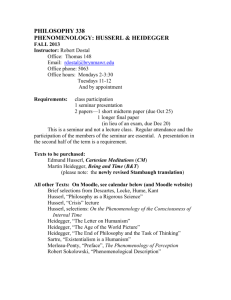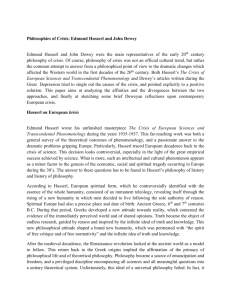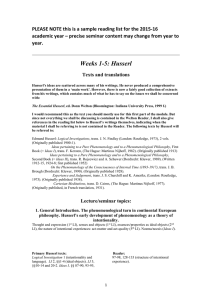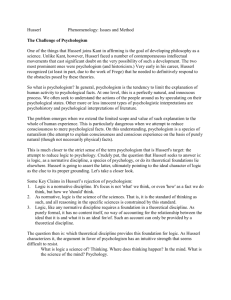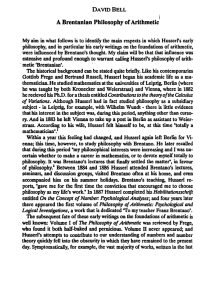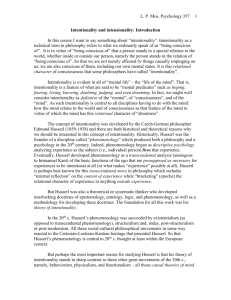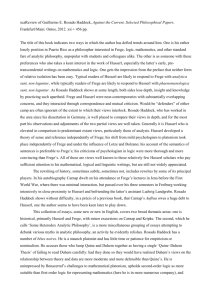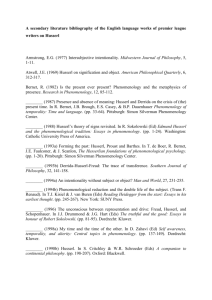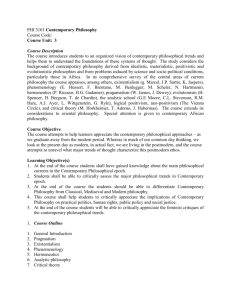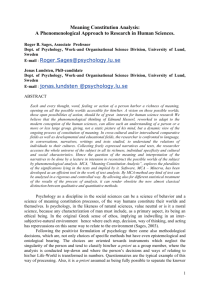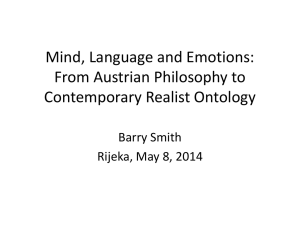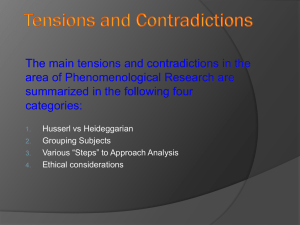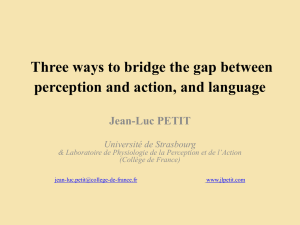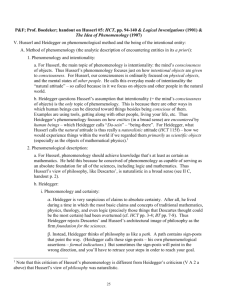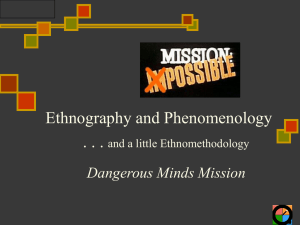Precis 1
advertisement
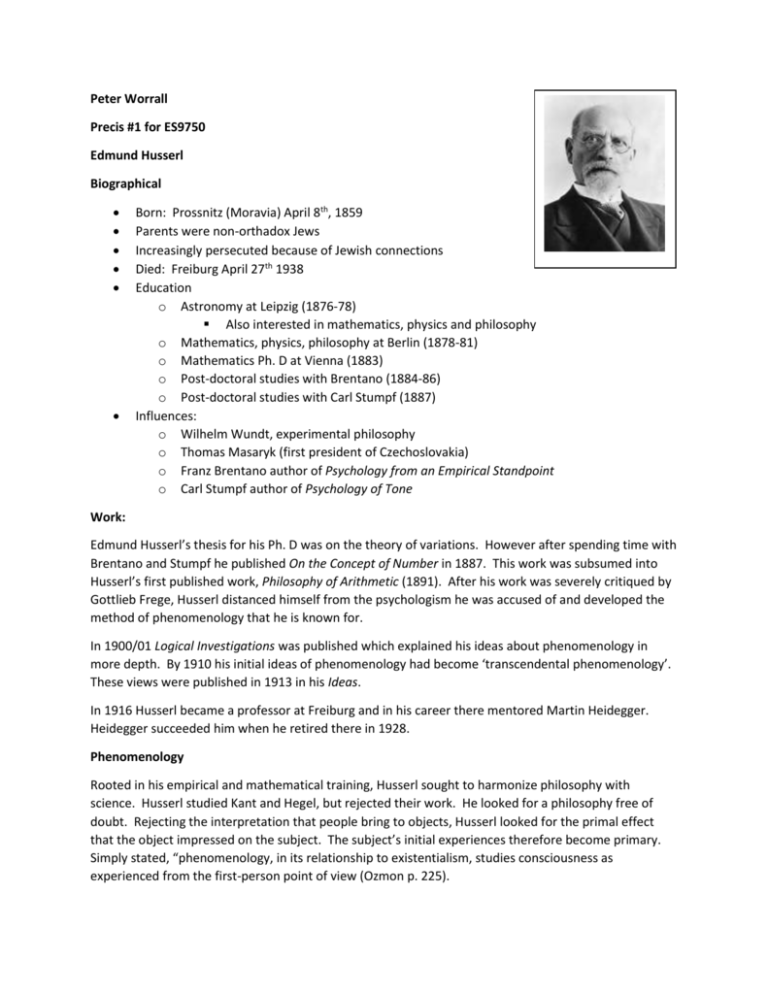
Peter Worrall Precis #1 for ES9750 Edmund Husserl Biographical Born: Prossnitz (Moravia) April 8th, 1859 Parents were non-orthadox Jews Increasingly persecuted because of Jewish connections Died: Freiburg April 27th 1938 Education o Astronomy at Leipzig (1876-78) Also interested in mathematics, physics and philosophy o Mathematics, physics, philosophy at Berlin (1878-81) o Mathematics Ph. D at Vienna (1883) o Post-doctoral studies with Brentano (1884-86) o Post-doctoral studies with Carl Stumpf (1887) Influences: o Wilhelm Wundt, experimental philosophy o Thomas Masaryk (first president of Czechoslovakia) o Franz Brentano author of Psychology from an Empirical Standpoint o Carl Stumpf author of Psychology of Tone Work: Edmund Husserl’s thesis for his Ph. D was on the theory of variations. However after spending time with Brentano and Stumpf he published On the Concept of Number in 1887. This work was subsumed into Husserl’s first published work, Philosophy of Arithmetic (1891). After his work was severely critiqued by Gottlieb Frege, Husserl distanced himself from the psychologism he was accused of and developed the method of phenomenology that he is known for. In 1900/01 Logical Investigations was published which explained his ideas about phenomenology in more depth. By 1910 his initial ideas of phenomenology had become ‘transcendental phenomenology’. These views were published in 1913 in his Ideas. In 1916 Husserl became a professor at Freiburg and in his career there mentored Martin Heidegger. Heidegger succeeded him when he retired there in 1928. Phenomenology Rooted in his empirical and mathematical training, Husserl sought to harmonize philosophy with science. Husserl studied Kant and Hegel, but rejected their work. He looked for a philosophy free of doubt. Rejecting the interpretation that people bring to objects, Husserl looked for the primal effect that the object impressed on the subject. The subject’s initial experiences therefore become primary. Simply stated, “phenomenology, in its relationship to existentialism, studies consciousness as experienced from the first-person point of view (Ozmon p. 225). Metaphysics/Ontology The nature of existence is materialistic in nature. Reality is reduced to the first-person impressions on the consciousness. The ‘existence precedes essence’ motif of the existentialist can be related to the empirical perspective of Husserl and his followers. The scientific world of phenomena is only of value in this approach in so far as it leaves an impression. Epistemology Most of what an average person claims to ‘know’ is interpretation. What is really known is the immediate data which precedes interpretation. I see a problem with the use of language to report the data. The melding of empirical science with experimental psychology creates data which forms the foundation of knowledge. How Husserl interpreted the data was unclear from my research. The way I understand Husserl is that he thought things could be known by sensory experience alone. However, he also believed Axiology Although Husserl lived a world informed by Judeo-Christian values, with a predisposition to Jewish morality, his value system was to be predicated on immediate impulses. The subjective experience of phenomena would be of primary value. Educational Implications Husserl’s methods are connected, by Howard Ozmon, to the Existentialists. This is due to his emphasis on subjective experience. However, rather than the sense of exploration that typifies Sartre and the condemned to be free mantra, Husserl was more interested in subjective impulses and their relationship to logic. It would seem an outworking of Husserl’s phenomenological philosophy would be to expose to students to stimuli and have them report on their subjective experience. This experience would be assessed for logic. Logical progressions can be made by combining reported primordial sense experiences. In this way a network of knowledge can be constructed and the student becomes educated. However, in my cursory readings it seems like students are more like guinea-pigs in a laboratory. They would provide a source of data for the experimental teacher who could examine them and construct further experiments to satisfy their curiosity. There is something of Buber’s I-Thou that is missing from the narrative about Husserl and his philosophy. Perhaps after further investigation a more holistic perspective will appear, but the reductionist materialism and dislocation of events from a connecting narrative seems reflective of the times. The individual is an alienated data source. Bibliography Ozmon, Howard A Philosophical Foundations of Education (9th Edition) Pearson, 2012 http://plato.stanford.edu/entries/husserl/
